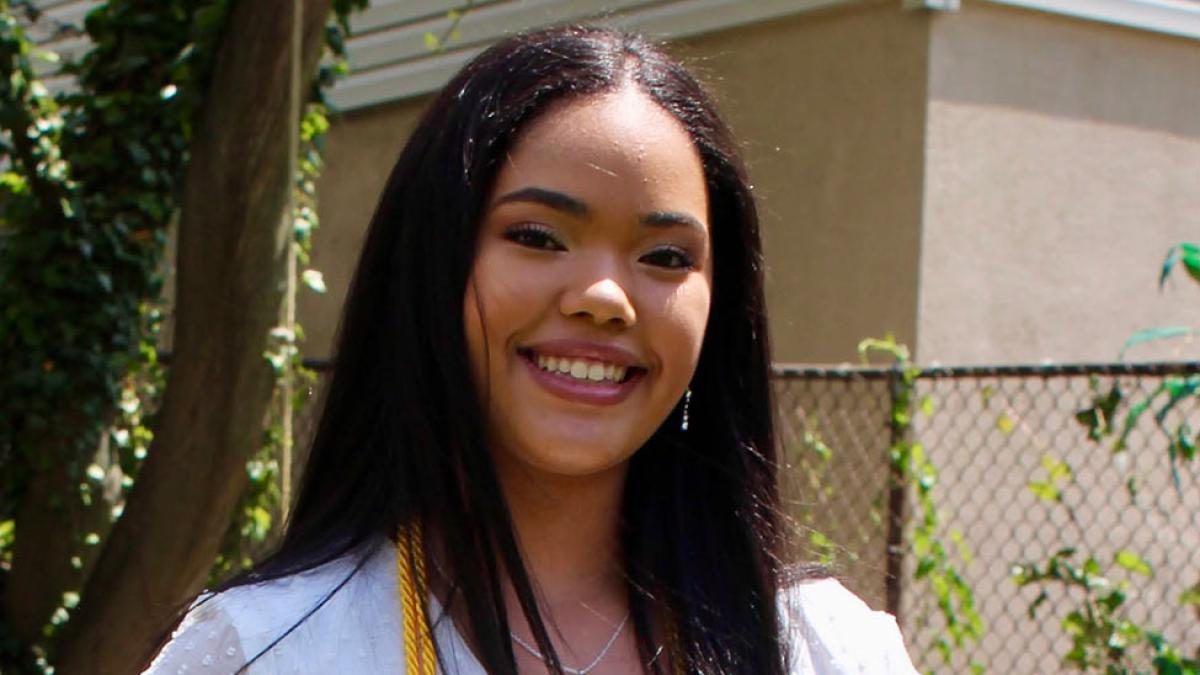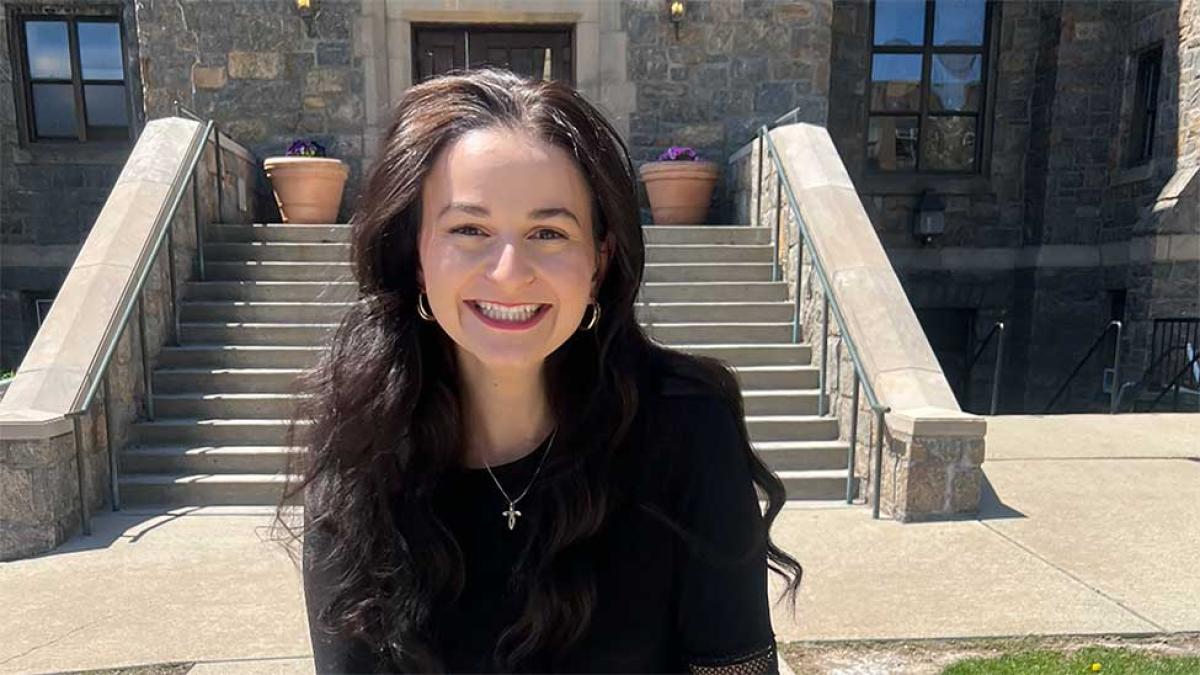From mentee, to mentor, to president of the First Generation Student program, Valentina Rojas Abreu ’24 knows the importance of community. Looking forward to National First Generation Student Day on November 8, Valentina reflects on the evolution of the first-gen program and what makes the first-gen community at Pace so special.
Record-Breaking Success for Haub Law in the National Trial League Competition
Haub Law’s team for the National Trial League Competition broke a record this year as they were the only school to ever remain undefeated in the National Trial League’s regular season, with a solid finish of seven wins and zero losses.
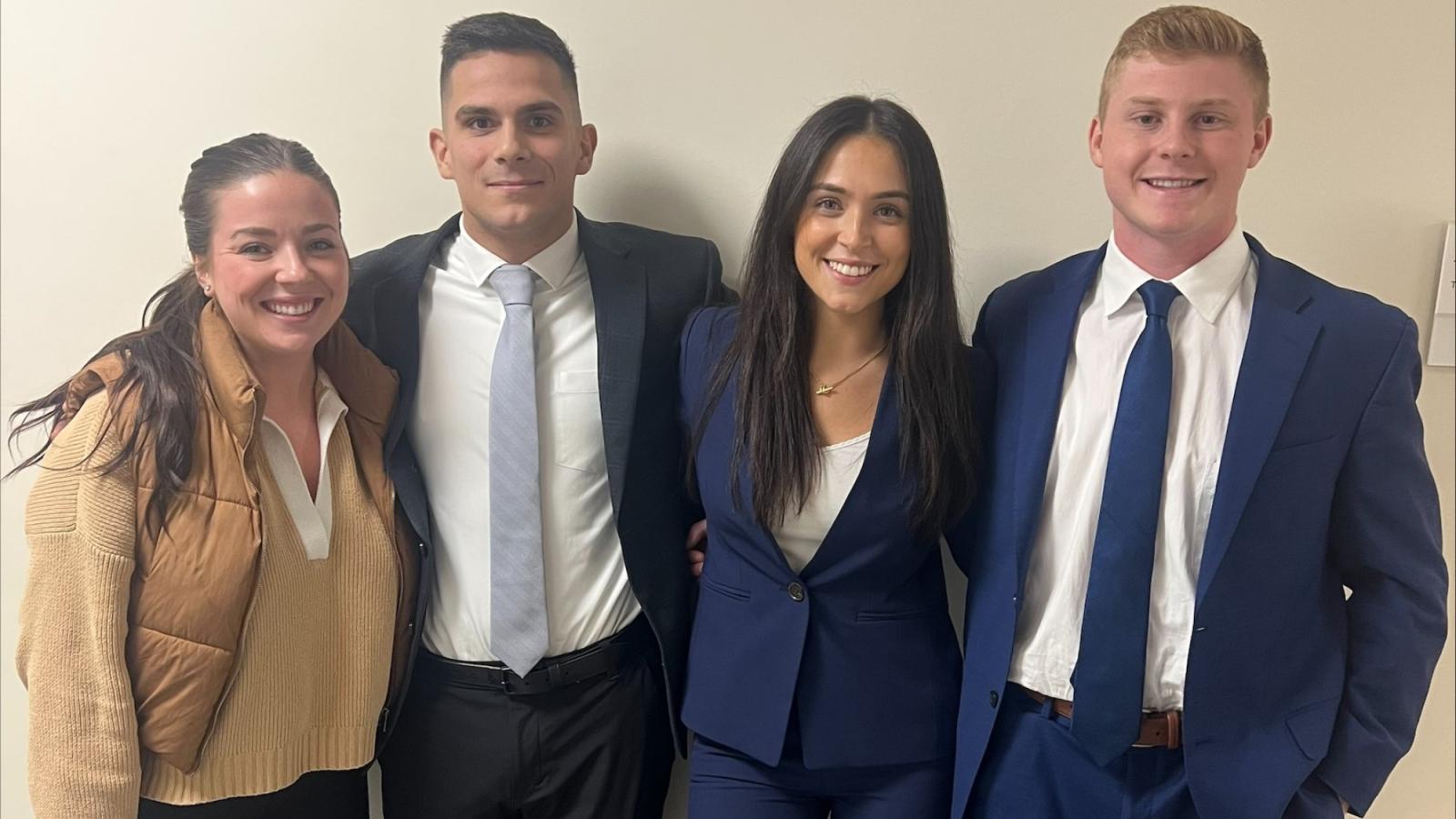
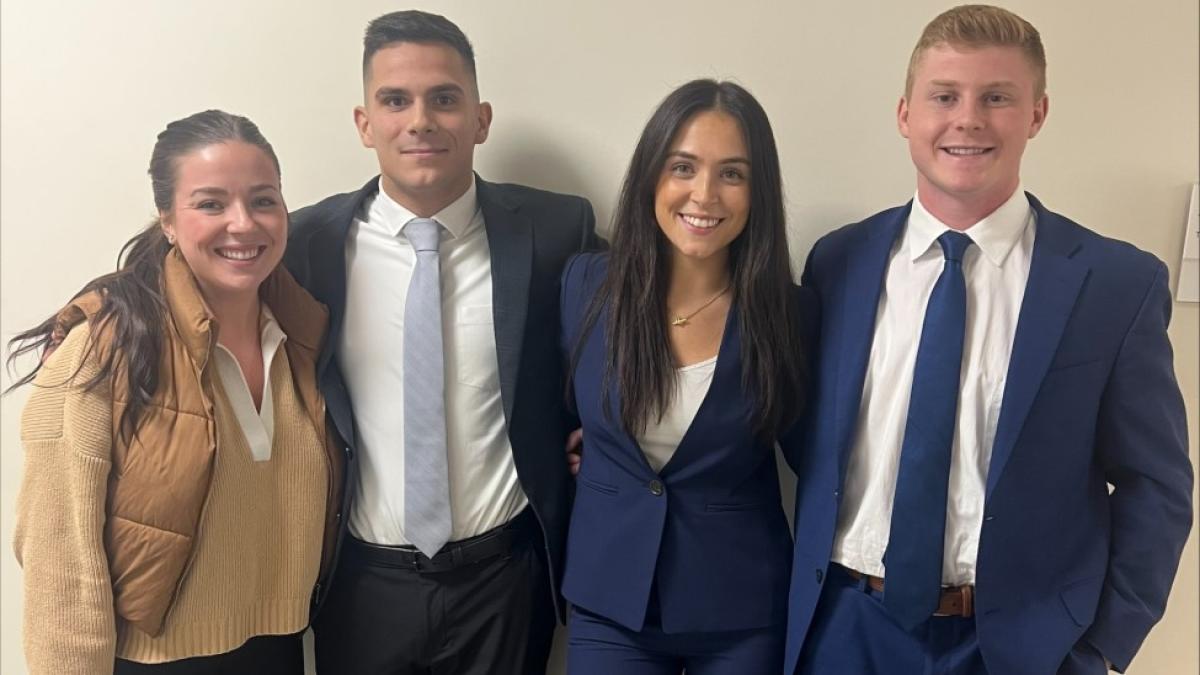
Haub Law’s team for the National Trial League Competition broke a record this year as they were the only school to ever remain undefeated in the National Trial League’s regular season, with a solid finish of seven wins and zero losses. The regular season of the competition ran every two weeks beginning in August and commencing in November. Haub Law is one of four teams that will now move on to playoffs in spring 2024. In addition to Haub Law’s undefeated record, this is the first year since Haub Law started participating in the competition that they have made the playoffs. The Haub Law team was coached by Samantha Tighe ’20 and Hilary Quinn. Haub Law students Joseph Demonte, Liam Rattigan, Chloe Devanny, Matthew Mattesi, Stephanie Areford, Victoria Buzzanca, Alexandra Stata, Arianna Cruickshank, Sabrina Rehfeld, and Katerine Balukas were amongst the students who participated over the course of the seven competitions.
Throughout the Competition, Haub Law students Joseph Demonte, Chloe Devanny, and Alexandra Stata were awarded best advocate awards as well. Student competitor Joe Demonte notes that, “Every time I compete, I feel like I get better, and I really enjoy the competitive aspect of mock trials. This specific competition was really enjoyable because of the short turnaround time. Every two weeks there's a competition so you do not have much time to get ready. I enjoy this challenge because it really tests your ability to think on your feet. This competition is also really a team effort, we would not be as successful as we have been without everyone’s efforts and our coaches.”
During the playoffs this upcoming spring, Joseph Demonte, Liam Rattigan, and Chloe Devanny will compete on behalf of Haub Law. Student competitor Chloe Devanny also notes that hard work that went into the seven rounds of the competition. “If it wasn’t for every single student advocate working their hardest, we would not have the amazing opportunity to compete in the upcoming finals,” said Chloe. Professor Lou Fasulo, Director of Haub Law’s Advocacy Programs and Professor of Practice in Advocacy, added, “I have had the opportunity to work with dozens of great law student advocates, this group of advocates rose to the highest level of expectation and defeated some of the top Trial schools in the country,” said Professor Fasulo. “Their dedication, work ethic, and talent was outstanding and the results prove it. The team’s undefeated status caps a terrific fall competition schedule. Haub Law is proud and our reputation is enhanced by their success.”
Q&A with First Generation Student Valentina Rojas Abreu '24
Get to know Valentina Rojas Abreu '24, a first-gen student and President of the First Generation Program at Pace, as she shares her journey of independence and community, and offers insights into the challenges and strengths faced by first-gen students.
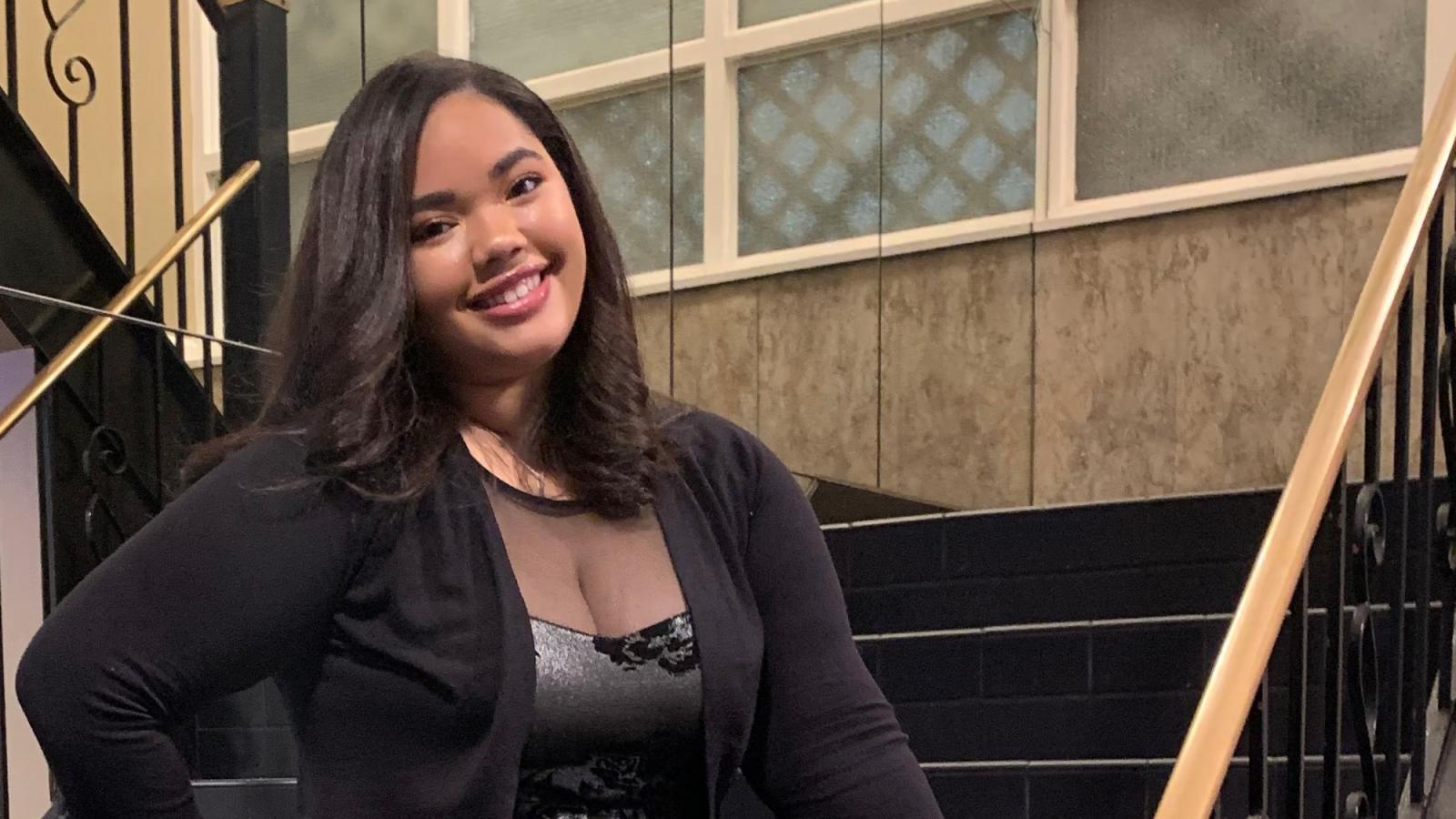
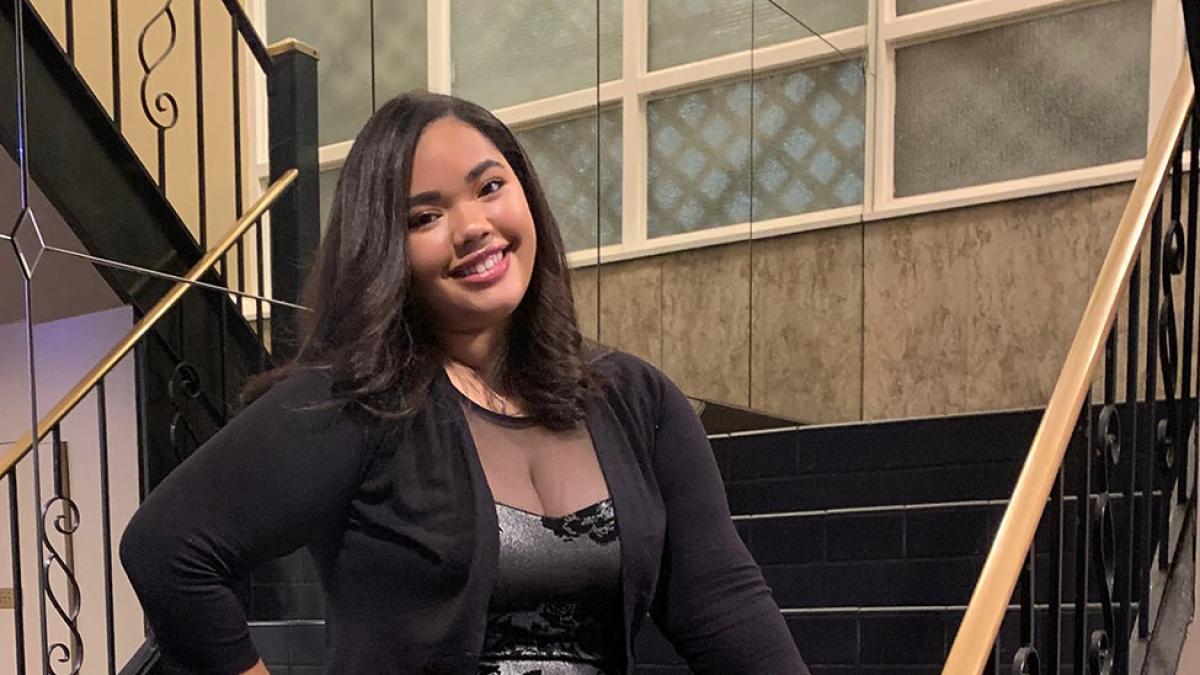
Valentina Rojas Abreu ’24 knows the experience of a first generation student better than most. Not only is she one herself, but she’s been helping cultivate a supportive network as President of the First Generation Program.
Read on to hear her perspective on the distinct challenges and triumphs that define the first generation student experience.
Why did you choose Pace?
I’d heard great things all through high school about how many connections Pace has to different companies and programs. I liked that I could commute and that there was a New York City Campus I could take advantage of if I wanted to.
What are some of the challenges of being a first generation student?
A lot of us first generation students are so independent because we don't have that safety net. Not that we don't have people to depend on, but at least on an academic standpoint, you are on your own.
What are some of the hidden ‘super powers’ of being a first generation student?
As a first generation student, I ended up being very independent. I'm the firstborn in my family. So I don't have an older sibling to ask ‘how did you do this’ or ‘what is FASFA?’ I feel like a lot of our students, including myself, feel like school is a bit easier now because I've been doing everything by myself. Having to figure things out on your own can help students reach for the stars. They know how to opportunities or have higher aspirations because they know they’ve always had to.
What do you want fellow first generation students to know?
Some people don’t even realize they’re a first generation student. Even if your parents received an associate degree rather than a four-year degree, or your siblings have gone to college, you're still considered a first generation student.
I try to encourage students in the First Generation Program in the same way I was encouraged.
Q&A with First Generation Student Danielle Shoulders ’24
Join Danielle Shoulders '24 on her transformative journey as a first generation student at Pace, where she's making every moment count. From her Environmental Studies program, student clubs, internships, and more, learn how she's overcoming challenges and helping create a vibrant community.
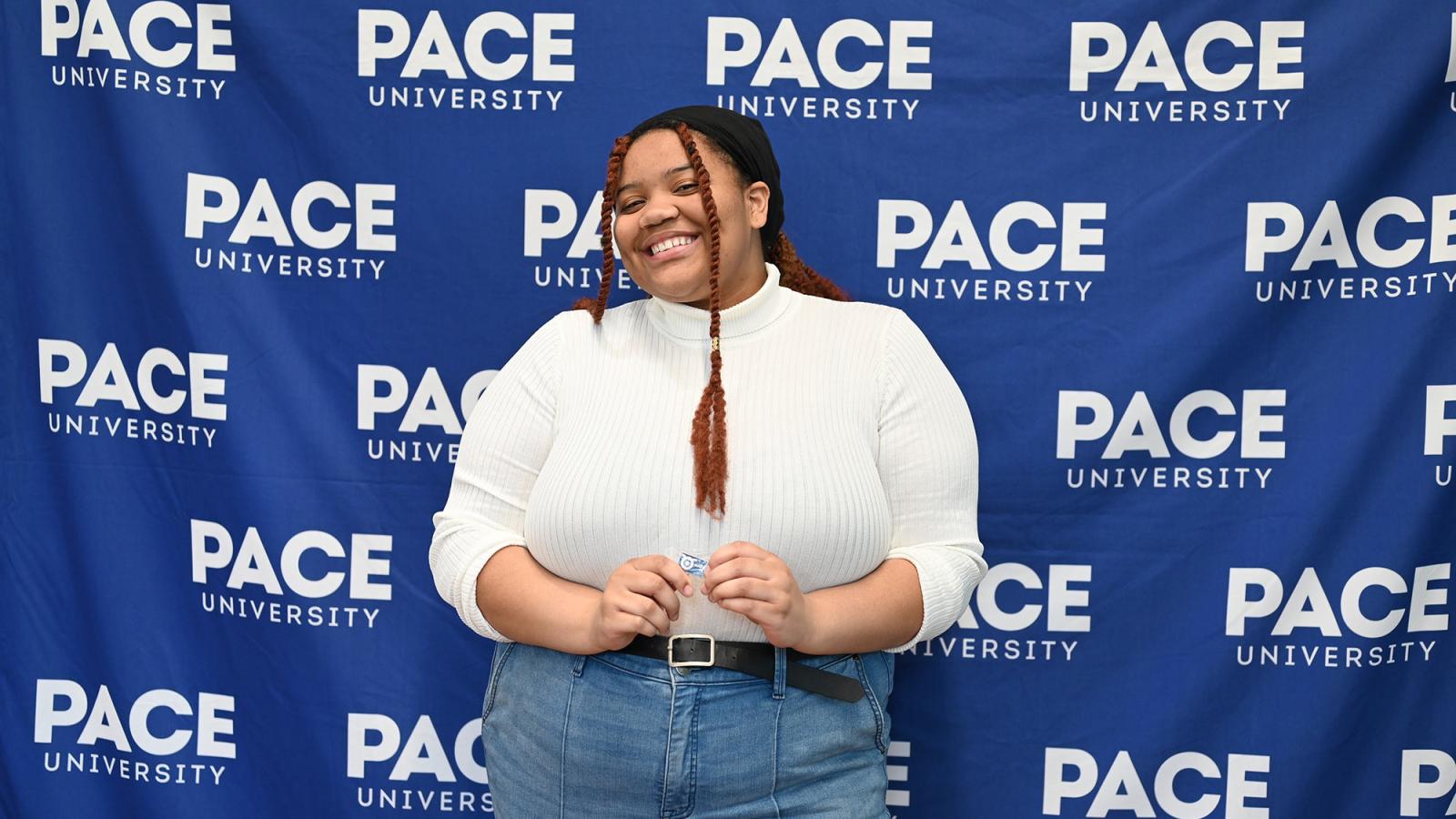
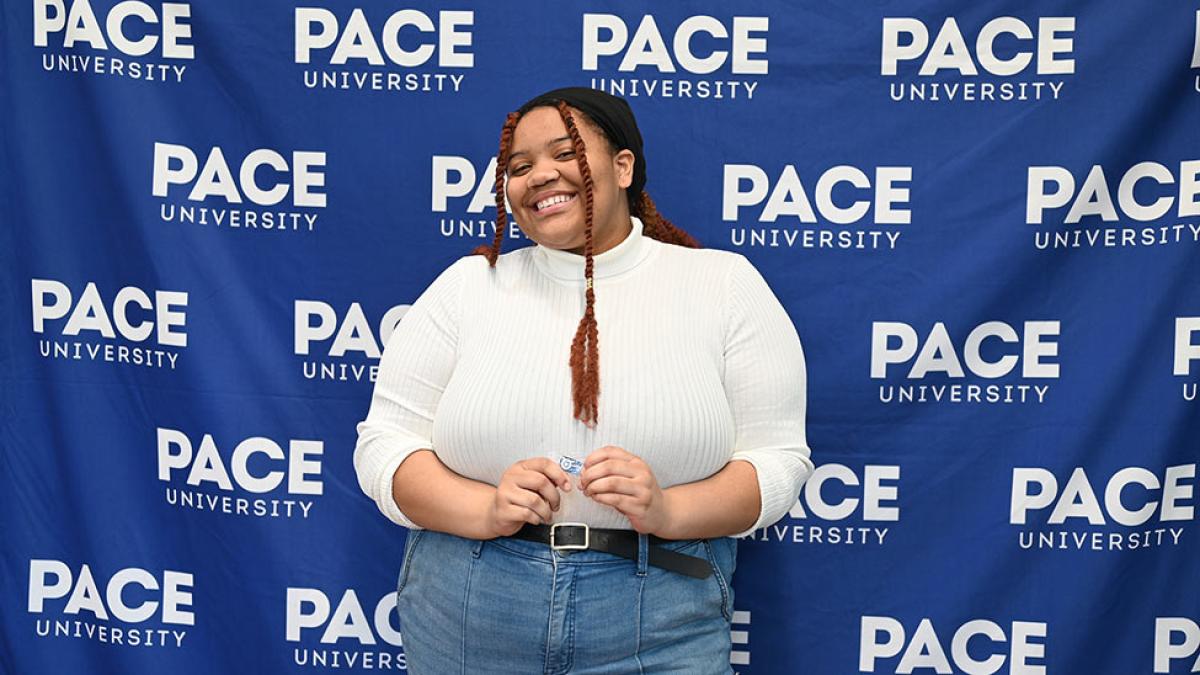
Danielle Shoulders ’24 has embraced her journey as a first generation student with resilience and enthusiasm. She’s transferred from a small college in Ohio and is now thriving at Pace, not only pursuing a bachelor’s in Environmental Studies but also actively engaging in student clubs like the Black Student Union and working in various internships to ensure she’s career-ready.
Danielle's story may feel familiar to many other first-gen students. Fortunately, Pace’s first generation student community has helped her forge lasting connections of like-minded people who understand both the ambitions and hurdles that come along with navigating college as a first-gen student.
She shared her unique experience as a first generation student and how Pace's supportive environment has been instrumental along the way.
What does it mean to you to be a first generation student?
To me, being first generation acknowledges that my college experience is different because of my parents’ degree status. I fully understand that not only am I striving to finish college, but to also make my parents proud by completing my degree and experiencing the full college experience they didn’t get to have.
As a first generation student I carry a lot of responsibility. It can be tempting to procrastinate on my homework or to sleep in instead of going to events, but I want to always take full advantage of being in college and not waste a second. I also try to prepare myself for my career while I’m in college by participating in a variety of opportunities, like internships and club positions.
What are some of the challenges of being a first generation student?
A unique challenge of being a first generation student is not being able to ask about the college experience from my parents. I have overcome this by making my own support system of reliable college resources, other students, and supporting faculty. Pace has a wide range of resources and events that college students can attend to learn more about the ins-and-outs of college.
Why is it important to be part of a first generation student community?
Finding community with other first generation students helps me go into a place where people understand the same struggles. It can be hard when you see other students always a step ahead while you grasp to understand the college system. Some first generation students don’t even know they are first generation, let alone where to go for financial help. College is an expected challenge when you have parents who have already experienced it, but for a first generation student it’s a surprise at every turn. Having a community where you don’t have to explain what you go through is a genuinely important safe space.
Why did you choose Pace?
I transferred to Pace from a small college on the outskirts of Ohio. During my first year I realized that it wasn’t the place for me and during a hard time I just sent in an application. I was so excited to see my acceptance letter from Pace that I burst out crying. Pace was my opportunity to explore my passions, find a diverse community, and live my true college experience.
What’s been the best part of your Pace experience?
The best part of my Pace experience has been creating community. I’ve met people that will be in my life forever. My first week I made so many friends that now, two years later, we are still as close as ever. I also have created connections with professors to deepen my academic understanding and network with other professionals in my field. Finding my people has been the most impactful part of my Pace experience.
Pace is my home, and it holds memories that I will cherish for a lifetime.
More from Pace
Meet D'Andrè Butler and follow along with his inspiring journey as a first generation student at Pace, balancing academics, work, and club leadership with an unwavering quest for independence. Read on to explore his unique challenges and triumphs, and how he's shaping his future at Pace.
Get to know Valentina Rojas Abreu '24, a first-gen student and President of the First Generation Program at Pace, as she shares her journey of independence and community, and offers insights into the challenges and strengths faced by first-gen students.
Q&A with First Generation Student D'Andrè Butler ’25
Meet D'Andrè Butler and follow along with his inspiring journey as a first generation student at Pace, balancing academics, work, and club leadership with an unwavering quest for independence. Read on to explore his unique challenges and triumphs, and how he's shaping his future at Pace.
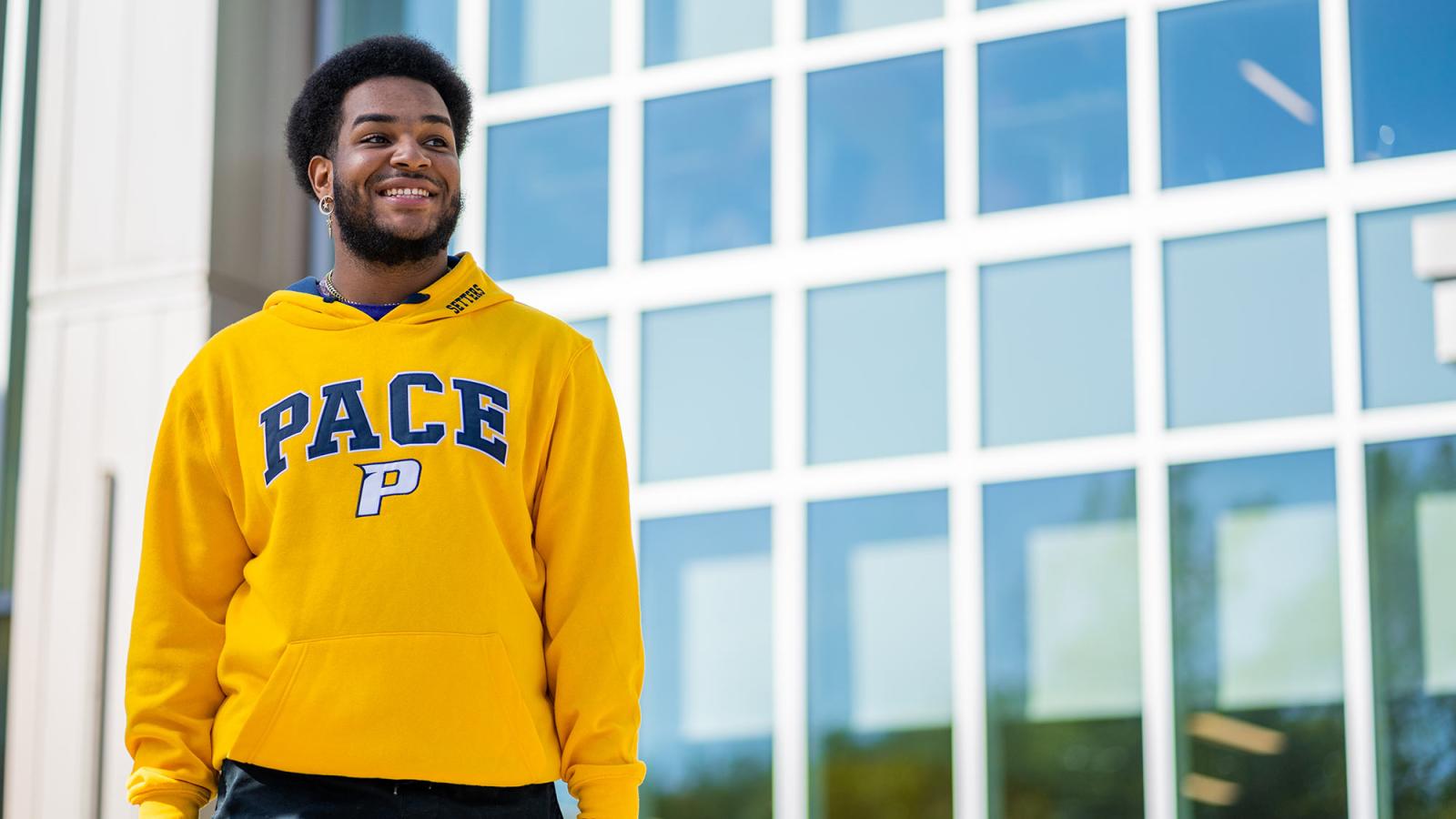
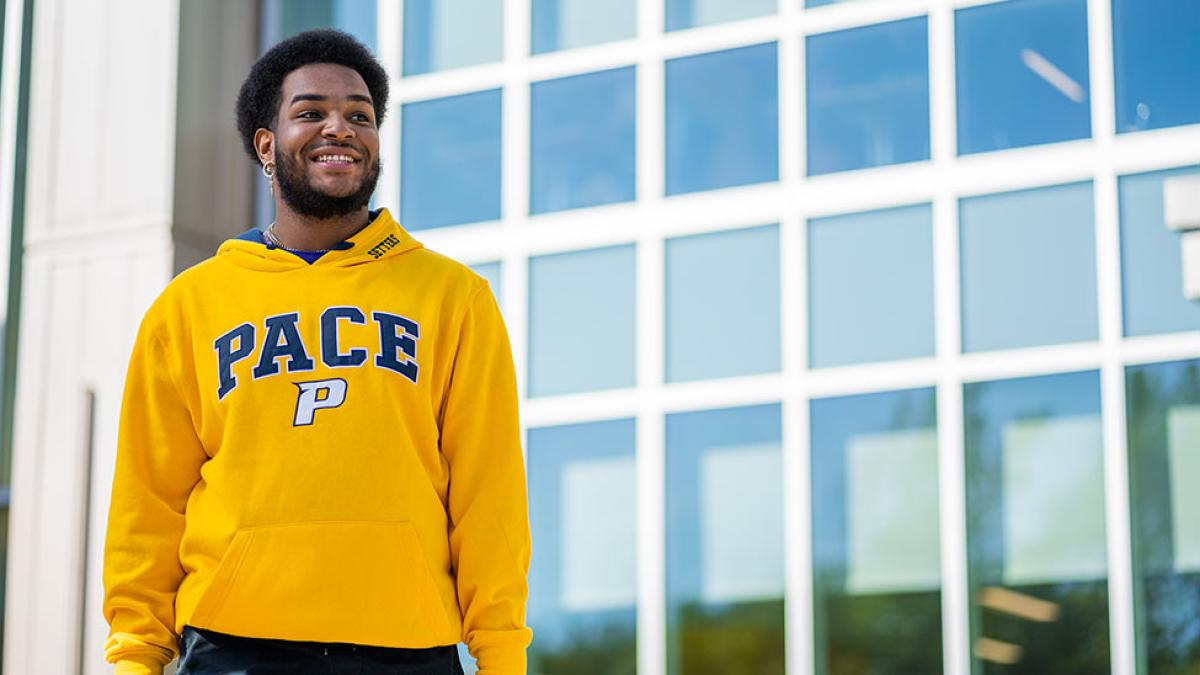
D'Andrè Butler ’25 is charting a remarkable path as a first generation student at Pace, ambitiously striving towards a sense of independence he has long craved. He’s thrown himself into the collegiate experience, not just in his academics as a writing and rhetoric major, but in student worker positions and club leadership.
D'Andrè juggles these roles and opportunities in the hopes of making the most of his time in school, a testament to the drive and ambitions so characteristic of his fellow first generation peers.
What does it mean to you to be a first generation student?
It means the world to me that I am someone in my family who made it to college and will not stop until I get my well-earned degree.
What are some of the challenges of being a first generation student?
As a first generation student I feel like I have to work harder than most people to make sure my spot at this school, as well as my future, is secured.
Budgeting my money is a unique challenge as a first-generation student. I have taken on the role of paying most of my tuition on my own, so knowing what to spend money on and what to sacrifice as a 20-year-old college student has been hard, but beneficial. Taking that into account, I have to work multiple jobs in order to finance my education while juggling student leadership roles.
Why is it important to be part of a first generation student community?
Connecting with other first-generation students is important because they are the only people who can relate to and understand my work ethic and my need for independence.
Why did you choose Pace?
I chose Pace because they offered more financial support and helped with my goal of independence. I knew moving to New York and making something of myself was something I always aspired to academically.
What’s been the best part of your Pace experience?
Networking has been the best part of my Pace experience. Since freshman year I have grown so much by creating opportunities for myself and making connections with pretty important people. I’ve worked as a resident advisor, a writing tutor, and a student assistant, while still staying involved in clubs. I’m the vice president and a choreographer in the hip-hop dance club and performance team, and vice president for a brand new fashion club called The House of Style.
More From Pace
From mentee, to mentor, to president of the First Generation Student program, Valentina Rojas Abreu ’24 knows the importance of community. Looking forward to National First Generation Student Day on November 8, Valentina reflects on the evolution of the first-gen program and what makes the first-gen community at Pace so special.
A first-generation American, and the first in her family to go to college and law school, Maria Profeta '22 always had the goal to use her education to better her family and her community.
Join Danielle Shoulders '24 on her transformative journey as a first generation student at Pace, where she's making every moment count. From her Environmental Studies program, student clubs, internships, and more, learn how she's overcoming challenges and helping create a vibrant community.
Pace University Small Business Development Center to Expand Programming to Serve Brooklyn Small Businesses & Aspiring Entrepreneurs
The Pace University Small Business Development Center (SBDC) has been tapped by the New York State SBDC network to expand the center’s service area to include Brooklyn as part of a pilot program.
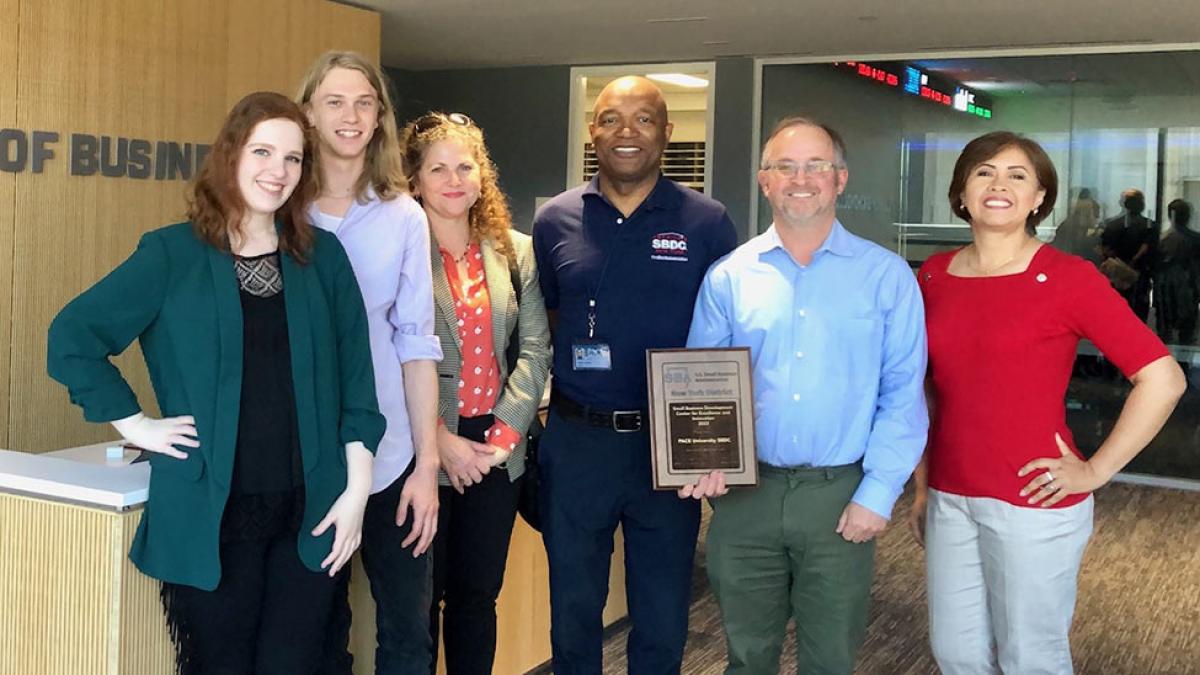
Lower Manhattan based Pace University Small Business Development Center to form a larger regional team serving New York City.
The Pace University Small Business Development Center (SBDC) has been tapped by the New York State SBDC network to expand the center’s service area to include Brooklyn as part of a pilot program.
Based out of the university’s lower Manhattan campus and as part of its Lubin School of Business, the Pace University SBDC provides in-depth and confidential one-on-one business advisement, training, and research to help small business owners and aspiring entrepreneurs grow or launch their business venture. All Pace SBDC services are offered at no cost to its clients through funding support by the U.S. Small Business Administration, the State of New York, and Pace University.
The Pace SBDC is part of a statewide network of 20 centers, and combines the resources of Pace University, and the public and private sectors to enable small businesses to reach their full potential. Since the center’s launch in 1986, the Center's experienced and NYS-certified business advisors have worked directly with more than 19,400 small businesses, helping them to invest over $245 million in the area's economy, and create or save over 8,800 jobs.
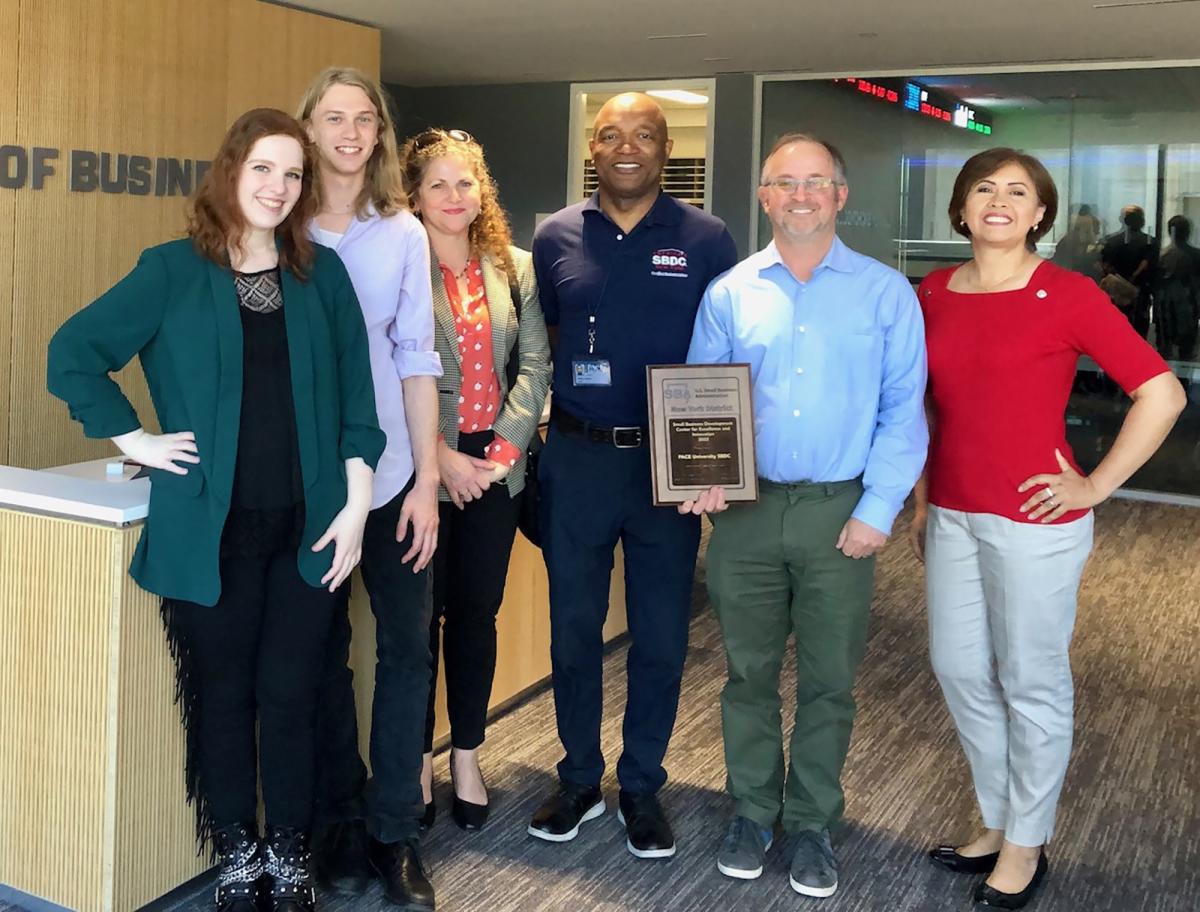
Starting on January 2, 2024, the Pace University SBDC will launch its programming for Brooklyn-based small businesses, including in-person and virtual one-to-one business advisement in access to financing, marketing and sales strategies, government procurement, business planning and more. The expansion of services will be led by Pace University SBDC Regional Director Andrew Flamm.
“I am excited to launch Pace SBDC’s high-impact counseling services and training programming in Brooklyn, my home borough,” said Flamm. “Our team of business advisors has tremendous experience helping small businesses build and grow in their communities, and we look forward to deepening connections in Brooklyn’s neighborhoods to help generate new jobs and business investment.”
“Andrew Flamm and his high-performing team at the Pace SBDC offer an invaluable resource to countless New York City small businesses and exemplify Pace University’s commitment to advancing opportunities for our community,” said Pace President Marvin Krislov. “We’re pleased they’ll be expanding their work into Brooklyn, and we’re excited to see them build on their successes—and the long tradition of success at the Lubin School of Business.”
“Pace University’s Lubin School of Business is committed to community partnerships and entrepreneurial growth,” said Lawrence Singleton, dean of the Lubin School of Business. “As a longstanding host to the SBDC, we are delighted that the center will expand its service area to support Brooklyn-based small business owners and build economic opportunity. We thank NYSBDC State Director Sonya Smith and her leadership team for this opportunity for Pace University’s SBDC to extend business counseling and training to Brooklyn small businesses.”
"At the SBDC, we believe that shared resources and team-wide collaboration form an ecosystem of expertise to provide more small business services and offerings,” said Sonya Smith, State Director of the New York Small Business Development Center. “We are excited about this effort to better serve Brooklyn based small businesses. We always strive to improve our clients' experience and services and build bridges between communities. We see this as that opportunity."
“As Ranking Member of the House Committee on Small Business, I know that small businesses are the backbone of our economy, and I am deeply passionate about supporting small firms in New York and across the country,” said Congresswoman Nydia M. Velázquez, whose district includes a number of Brooklyn neighborhoods. “SBDCs play a vital role in supplying entrepreneurs with the skills needed to turn their dreams of owning a successful business into a reality. The Pace SBDC’s expansion of services into Brooklyn will help ensure more New Yorkers have access to these critical services. I look forward to continuing to work with Pace SBDC to support small businesses in my district and provide the resources necessary to grow and thrive.”
SBDCs are U. S. Small Business Administration (SBA) resource partners, and the Pace SBDC received an SBDC of Excellence & Innovation award from the SBA in 2022.
“The Pace SBDC has been a valuable partner, from helping small businesses access SBA pandemic recovery loan programs to co-hosting successful in-person small business financing programs and will be an effective resource for Brooklyn small businesses,” said John Mallano, District Director of SBA’s New York District Office.
Pace SBDC’s in-person one-to-one business advisory sessions will kick off from the Brooklyn Public Library’s Central Library.
“We are delighted to partner with Pace SBDC and provide space for their advisors to conduct one-to-one counseling sessions,” said Natalie Cannestra, Manager, Business & Career Services at the Brooklyn Public Library. “Pace SBDC’s support of Brooklyn small businesses and aspiring entrepreneurs aligns with the BPL’s Business & Career Services’ focus on providing skills and knowledge to generate economic opportunity for our patrons.”
About Pace University
Since 1906, Pace University has been transforming the lives of its diverse students—academically, professionally, and socioeconomically. With campuses in New York City and Westchester County, Pace offers bachelor, master, and doctoral degree programs to 13,600 students in its College of Health Professions, Dyson College of Arts and Sciences, Elisabeth Haub School of Law, Lubin School of Business, Sands College of Performing Arts, School of Education, and Seidenberg School of Computer Science and Information Systems.
About The Pace University Small Business Development Center (SBDC)
The Pace University Small Business Development Center (SBDC) is part of a statewide network created to help small business owners and aspiring entrepreneurs grow or launch their business ventures. Funded by the U.S. Small Business Administration (SBA), the State of New York and Pace University, the Pace SBDC combines the resources of Pace University and the public and private sectors to enable small businesses to reach their full potential. Since our start in 1986, the Center's experienced and NYS-certified business advisors have worked directly with more than 19,400 small businesses, helping them to invest over $245 million in the area's economy, and create or save over 8,800 jobs.
Legal Scholar “Confident” Judge Who Lifted Trump Gag Order “Greatly Regrets” Decision After Threats
“The main legal challenge to gag orders in general is that they infringe on the First Amendment right to free speech,” Bennett Gershman, a law professor at Pace University, told Salon. “Courts have to balance the danger to the personal safety of the persons being targeted by Trump’s inflammatory rhetoric as well as the damage to the integrity of judicial proceedings with the right to speak.”
Is ChatGPT the New CliffsNotes?
Faculty Focus covers a story on ChatGPT being the new CliffsNotes, they mentioned collaborating with librarians to create a library or research guide, such as the ones developed by Pace University would be beneficial for faculty, staff, and students navigating generative AI tools.
Who Is In Charge Of Cybersecurity At Your Business?
Elisabeth Haub School of Law Professor John Bandler writes a piece in Westfair Communication about the importance of designating someone in charge of cybersecurity at your business.
The Debt Is Too Damn High – Time to Establish a National Bi-partisan Fiscal Commission
Dyson Professor Stephen Rolandi pens an op-ed in the PA Times about the national debt being too high and says that it’s time to establish a national bi-partisan fiscal commission.
Are Two Black Women Lawyers Taking Down Donald Trump?
Elisabeth Haub School of Law Professor Bennett Gershman speaks with The Good Men Project about two African-American women lawyers and public officials leading the prosecutions of Donald Trump, and in both the New York and Georgia cases, they appear to be succeeding.
